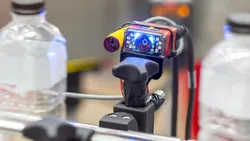
Input Sensors with PLC: Sinking and Sourcing 
This course will teach you how to connect wire sensors to a PLC using two common methods, sinking and sourcing. You will learn the differences between the two methods and how to use them in different scenarios. You will also learn how to troubleshoot and debug any issues that may arise. By the end of the course, you will have a better understanding of how to use input sensors with PLCs. Sign up now and start learning today! ▼
ADVERTISEMENT
Course Feature
![]() Cost:
Cost:
Free Trial
![]() Provider:
Provider:
LinkedIn Learning
![]() Certificate:
Certificate:
Paid Certification
![]() Language:
Language:
English
![]() Start Date:
Start Date:
On-Demand
Course Overview
❗The content presented here is sourced directly from LinkedIn Learning platform. For comprehensive course details, including enrollment information, simply click on the 'Go to class' link on our website.
Updated in [August 31st, 2023]
Skills and Knowledge:
-Understanding of PLCs and their components
-Knowledge of sinking and sourcing methods
-Ability to connect wire sensors to PLCs
-Understanding of the electrical principles behind sinking and sourcing
-Knowledge of the different types of sensors and their applications
-Ability to troubleshoot and diagnose problems with input sensors and PLCs
-Understanding of safety protocols and procedures when working with electrical components
Professional Growth:
This course on Input Sensors with PLC: Sinking and Sourcing contributes to professional growth in several ways:
1. Enhanced technical knowledge: By learning how to connect wire sensors to PLC using sinking and sourcing methods, professionals gain a deeper understanding of the principles and techniques involved in industrial automation. This knowledge can be applied to various projects and tasks related to PLC programming and sensor integration.
2. Improved problem-solving skills: The course provides hands-on experience in connecting wire sensors to PLC, which helps professionals develop their problem-solving skills. They learn how to troubleshoot common issues that may arise during the sensor integration process and find effective solutions.
3. Expanded job opportunities: Proficiency in PLC programming and sensor integration is highly valued in industries such as manufacturing, automotive, and robotics. By completing this course, professionals can enhance their resume and increase their chances of securing job opportunities in these sectors.
4. Increased efficiency and productivity: Understanding the different methods of connecting wire sensors to PLC allows professionals to optimize the performance of industrial automation systems. They can select the most suitable method based on the specific requirements of a project, leading to improved efficiency and productivity in the workplace.
5. Continuous professional development: This course serves as a stepping stone for professionals who wish to further their knowledge and skills in the field of industrial automation. It provides a solid foundation for more advanced courses and certifications related to PLC programming and sensor integration, enabling individuals to stay updated with the latest industry trends and advancements.
Overall, the course on Input Sensors with PLC: Sinking and Sourcing contributes to professional growth by expanding technical knowledge, improving problem-solving abilities, increasing job opportunities, enhancing efficiency and productivity, and fostering continuous professional development.
Further Education:
This course on "Input Sensors with PLC: Sinking and Sourcing" is suitable for preparing for further education. It covers the essential knowledge and skills required to connect wire sensors to a Programmable Logic Controller (PLC) using two common methods, sinking and sourcing. Understanding these methods is crucial for anyone pursuing further education in the field of industrial automation, control systems, or PLC programming.
Course Provider

Provider LinkedIn Learning's Stats at AZClass
Discussion and Reviews
0.0 (Based on 0 reviews)
Explore Similar Online Courses

PostgreSQL: Client Applications

Film Appreciation

Python for Informatics: Exploring Information

Social Network Analysis

Introduction to Systematic Review and Meta-Analysis

The Analytics Edge

DCO042 - Python For Informatics

Causal Diagrams: Draw Your Assumptions Before Your Conclusions

Whole genome sequencing of bacterial genomes - tools and applications

PLC Memory Organization

PLC: Industrial Sensors


Start your review of Input Sensors with PLC: Sinking and Sourcing